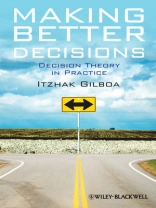Making Better Decisions introduces readers to some of the
principal aspects of decision theory, and examines how these might
lead us to make better decisions.
* Introduces readers to key aspects of decision theory and
examines how they might help us make better decisions
* Presentation of material encourages readers to imagine a
situation and make a decision or a judgment
* Offers a broad coverage of the subject including major insights
from several sub-disciplines: microeconomic theory, decision
theory, game theory, social choice, statistics, psychology, and
philosophy
* Explains these insights informally in a language that has
minimal mathematical notation or jargon, even when describing and
interpreting mathematical theorems
* Critically assesses the theory presented within the text, as
well as some of its critiques
* Includes a web resource for teachers and students
Inhoudsopgave
Preface viii
Acknowledgments x
1 Background 1
Suggested Reading 5
2 Judgment and Choice Biases 6
Introduction 6
Problems – Group A 9
Problems – Group B 12
Framing Effects 15
Brainstorming and Formal Models 20
Endowment Effect 22
Sunk Costs 27
Decision Trees 30
Representativeness Heuristic 34
Availability Heuristic 39
Anchoring 44
Mental Accounting 46
Dynamic Inconsistency 51
Exercises 53
3 Consuming Statistical Data 57
Introduction 57
Problems 58
Conditional Probabilities 63
Gambler’s Fallacy 72
Biased Samples 77
Regression to the Mean 80
Correlation and Causation 81
Statistical Significance 84
Bayesian and Classical Statistics 85
Exercises 93
4 Decisions under Risk 98
Introduction 98
Problems 99
The Independence Axiom 102
Von Neumann and Morgenstern’s Result 110
Measurement of Utility 113
Risk Aversion 116
Prospect Theory 123
Exercises 130
5 Decisions under Uncertainty 133
Introduction 133
Problems 134
Subjective Probability 141
Learning From the Fact We Know 151
Causality 163
The Sure Thing Principle 166
Alternative Models 171
Objective Probabilities 172
Exercises 174
6 Well-Being and Happiness 178
Introduction 178
Problems – Group A 179
Problems – Group B 180
Measurement Issues 184
What’s Happiness? 186
Exercises 188
Appendix A: Optimal Choice 191
Appendix B: Probability and Statistics 195
Solutions 204
Index 210
Over de auteur
Itzhak Gilboa is a chaired Professor in the Department of Economics and Decision Sciences at HEC, Paris and in the Eitan Berglas School of Economics at Tel Aviv University, and Fellow of the Cowles Foundation at Yale University. He previously held the position of chaired Professor at the Kellogg School of Management at Northwestern University. Gilboa’s research focuses on decision under uncertainty. He has worked with David Schmeidler on axiomatic foundation of non-Bayesian decision theory and contributed to research in complexity in game theory, evolutionary game theory, and social choice. He is co-author of A Theory of Case-Based Decisions (with David Schmeidler, 2001), and author of Theory of Decision under Uncertainty (2009) and of Rational Choice (2010).












